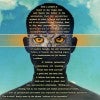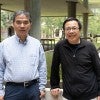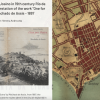
Environmental champions win Rice grants
The Rice University Sustainable Futures Fund backs six projects to help bolster the planet’s environmental health.

Environmental champions win Rice grants
The Rice University Sustainable Futures Fund backs six projects to help bolster the planet’s environmental health.

As time goes on, Americans are moving less often
Migration in the United States has been on a downward trend since the 1960s, according to new research from Rice University.

February freeze analyzed one year later
Last February’s severe winter storm caused sustained peaks in demand for electricity across Texas, triggering tremendous stress on the state’s power grid and widespread outages lasting days. Now a new report from Rice University’s Baker Institute for Public Policy examines why the winter storm caused this deadly electricity supply crisis and how it could have been avoided.

Bacterial ‘bully’ could improve food production
Lactic acid bacteria that thrive in many organisms, including humans, employ a hybrid metabolism that combines respiration and fermentation to give it an advantage over competitors. Researchers say the discovery could lead to enhanced techniques for food and chemical production.

Rice announces plans to be carbon neutral by 2030
Rice President David Leebron and Provost Reginald DesRoches outlined the efforts in a message to the university community Feb. 11.

Rice to host international conference on scholarship of the paranormal March 3-6
“Opening the Archives of the Impossible” will also showcase collections housed in university library

Physicists find evidence of new quantum phase
Rice physicists collaborated on the discovery of a quantum phase that appears to break time-reversal symmetry.

Clearly, this heart beats strong
In time for Valentine’s Day, engineers at Rice University and Waseda University provide a realistic view of what happens inside a beating heart.

Rare earth elements await in waste
Rice University scientists applied their flash Joule heating process to coal fly ash and other toxic waste to safely extract rare earth elements essential to modern electronics and green technologies.

‘Hydras’ artwork inspired by Robinson Lab imagery
Conrad’s newest piece installed at BRC; opening reception Saturday

Rice team’s mask strategy passes muster
During the early stages of the COVID-19 pandemic, a team at Rice University went looking for and found a way to make standard surgical masks better at keeping out small airborne droplets that might contain the SARS-CoV-2 virus.

imagineRio allows users to visualize five centuries of change in a modern megacity
Major rebuild to the Rice site adds 3,000 photos, new tools for teaching, learning

Energy transition could be headed for ‘valley of death,’ says report
Investments in oil and gas have decreased in favor of alternative energy in recent years, but with alternative energy technologies still able to supply only a small fraction of useable energy, rushing the transition would be a costly mistake, according to a new report from Rice University’s Baker Institute for Public Policy.

Matthew Jones wins NSF CAREER Award
Rice chemist Matthew Jones wins an NSF CAREER Award to study controlled growth of metallic nanoparticles for biomedicine, energy storage and computing.

Nathan Dautenhahn wins CAREER Award
Rice University computer scientist Nathan Dautenhahn wins a National Science Foundation CAREER Award to pursue simplified, automated security for sophisticated software.